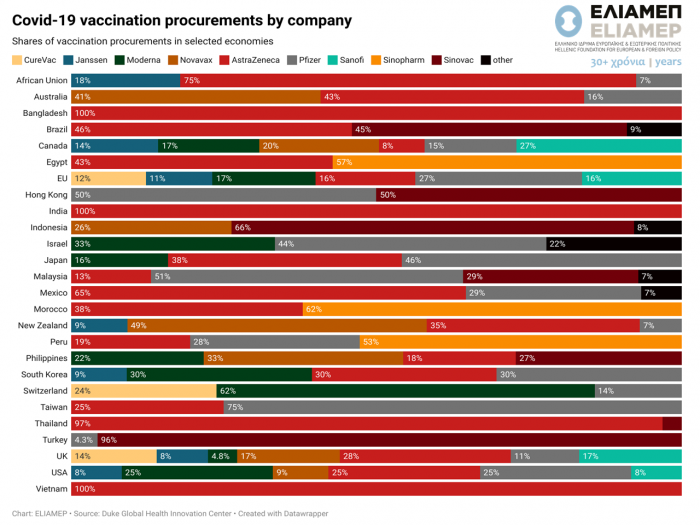During the past few weeks, there has been a worldwide debate over the possible side effects of Covid-19 vaccines such as AstraZeneca. The conclusion of the European Medicines Agency (EMA) was announced on Wednesday. The EMA reports that thrombosis is a possible but very rare side effect of the vaccine. Some countries have already announced age restrictions vis-à-vis the vaccine. What impact can these restrictions have on the course of vaccinations as a whole and what can they mean for economic recovery?
The chart above shows the shares of vaccination orders per company, as drawn from the Duke Global Health Innovation Center. The ranking of countries is based on the volume of orders that each country has made, while the data we present relates to the first 28 economies for which data are available. The EU is considered as a single entity in the graph, as its procurement strategy was common for all member states. Overall, AstraZeneca holds the largest share in all countries (34.3%), followed by Pfizer (21.5%), Sinovac (11.6%), Moderna (8.3%), Novavax (7.1%), Sinopharm (6.3%) and the rest with 10.4%.
We observe that the dispersion of orders between companies is higher in the richer economies than in the poorer ones. We observe that economies such as the EU and the US do not receive more than a quarter of their orders from their largest supplier (27% of EU orders are from Pfizer and 25% of US orders are from Pfizer and AstraZeneca alike). This dispersion allows them to obtain more doses in a timely manner but also to reduce the risk of possible complications in the supply chains. In contrast, poorer economies such as Bangladesh and Pakistan appear to have AstraZeneca as their sole supplier, while many countries have entered into agreements with only two suppliers (Turkey, Thailand, Taiwan, Hong Kong).
Undoubtedly, lower dispersion in supplies exposes these economies to a greater risk of delays or complications due to problems in the development and production of vaccines. It is important to note, however, that the effects of any slowdowns in vaccinations go beyond national borders and are linked to the recovery of the global economy. This is due to the interdependence of global economies. For example, the delayed exit of some parts of the world from the pandemic will have a direct impact on certain sectors that depend on international mobility, such as tourism and transport, while the prolonged restrictions in countries that are important links in global chains of specific activities, can create problems in the entire chain.




